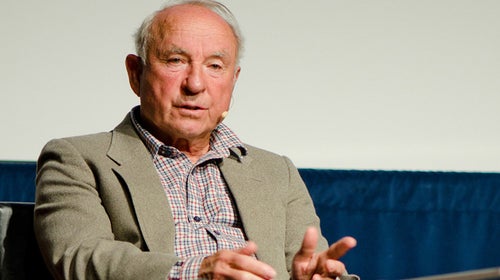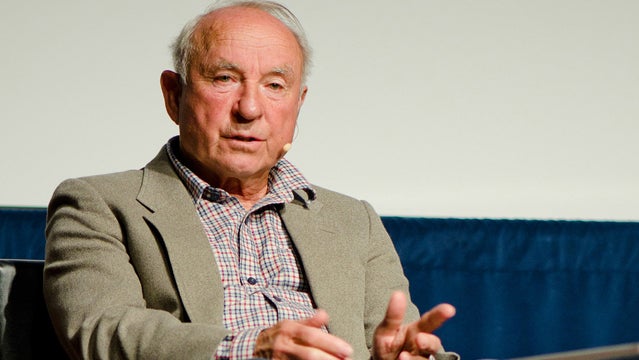Do you know what our real problem is? It’s that we’ve turned from citizens of the world to consumers of the world. Until we can admit that, like alcoholics admitting their dependence on the bottle, we’ll never be able to save the Earth. Or, at least, that’s what Patagonia’s Yvon Chouinard thinks. It’s one of many pearls he shared at a last week in San Francisco, hosted by GreenBiz.com. (Full disclosure: I’m a contributing writer at GreenBiz.com.)
���ϳԹ��� Ethics
Mary Catherine O’Connor and guest writers on environmental issues and the ethics of adventure.If you know anything about Chouinard and the environmental activism behind his outdoor apparel empire, such a bold statement will feel right in line with his ethos. But in a 30-minute interview with GreenBiz editor Joel Makower, Chouinard shared some surprising, often contradictory and always entertaining insights into his “accidental” career.
Chouinard speaks openly, always. Perhaps that is because he is a climber and surfer who happened to fall into the role of corporate titan rather than a ladder-climbing MBA who always had his eyes on a boardroom. Many business leaders are masterful at answering questions with sugar-coated, innocuous replies. Not so with Chouinard. When asked what he thinks of being compared to Steve Jobs, based on his design acumen and leadership, Chouinard bristled, criticizing the iPhone’s planned obsolesce. “It is made to be a disposable phone,” he said.
AGENTS OF CHANGE
On the topic of the outdoor industry’s environmental impact and efforts to lesson it, he vacillated from saying government action is what is really needed, to saying consumers need to lead, to saying that consumers don’t, actually, know what needs to be done and the responsibility falls on companies like his.
He said the outdoor industry is hemmed in by government’s inaction. I asked if he thinks Sally Jewell, the CEO of REI who President Obama has nominated to Secretary of the Interior, could change that. He does not appear hopeful. “I’ve only met [Jewell] a few times. But these people go to work for the government and are told ‘don’t do anything,'” he said.
There are two things about which Chouinard is very consistent: his pessimism and his distain for green business lingo. “I hate the word sustainability because whatever we’re doing to clean up our act, it’s not working,” he said, revealing a bit of his pessimism—he calls himself a “doombot.” But despite this, he clearly hasn’t given up on the notion that a company can do less harm.
“There is no difference between a pessimist who says ‘it’s all horrible, don’t bother’ and an optimist who says ‘it’s all fine, don’t bother,'” he said, modestly adding that he thinks he has managed “to do a little to help out.”
That said, he tried to tackle the innate hypocrisy of saying we consume too much while leading a company that is selling things for people to consume—and coming out with new versions of things for people to consume each season. “The elephant in the room that no one talks about is growth,” he said, pointing to the SkyMall catalog as the pinnacle of stuff we don’t need.
ANOTHER POLO SHIRT?
But Chouinard also admitted that Patagonia failed in its intentions, dating back to the ’90s, to stay small and shrink its product line. “We didn’t pull it off. We were being pulled to grow, grow, grow. But we’re readdressing it now.”
In doing so, he said Patagonia is cooking multi-functionality into products as much as possible and winnowing out superfluous items. “Who needs another polo shirt?” he asked.
Regardless of whether they need one, plenty of people will buy another polo shirt, conceivably until the world ends (or so it seems). So what role do we consumers play in Chouinard’s vision for a better planet?
His opinion ranged rather widely. When asked whether consumers are helping to guide Patagonia’s environmental agenda, Chouinard quipped, “we don’t learn much from our customers—we are so far ahead of them.”
But later, he said consumers are always a major player in any real and sustaining change, and he holds out particular hope for young consumers, especially when it comes to authenticity versus marketing. “Millennial kids see through all that bullshit,” he said. Chouinard believes they’re environmentally aware and they’ll express that with their purchases.
Let’s hope those kids like salmon. Because amid talk of bringing Patagonia back to its small and humble roots, Chouinard expressed interest in food and said it’s a part of the company he’s putting a lot of energy into. Chief among these efforts is Patagonia Provisions, a program that includes sourcing salmon from rivers in British Columbia, caught sustainably by First Nation fishermen. Patagonia partnered with Skeena Wild, a Canadian fish conservation organization, on the project.
Aside from his faith in the next generation of consumers to vote with their wallets, Chouinard expressed one other bit of good news, at least from the point of view of a don’t-call-it-sustainable sustainable business leader. “When we make decisions that are right for the planet,” he said. “It makes us money.”


